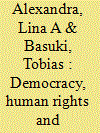| Srl | Item |
| 1 |
ID:
136667


|
|
|
|
|
| Summary/Abstract |
After the transition period, the Yudhoyono administration seems to be more confident to craft incorporate human right factor in to foreign policy consideration. Indonesia, under his leadership, has been very much interested to developed the Indonesia’s soft power diplomacy through the effort to promote democracy and human rights values both regionally and globally. In the beginning of his administration, the ministry of foreign affairs has pursued for promotion and protection of human rights as new principle to be observed by ASEAN member states, and later as one of important pillar in developing ASEAN political security community.
|
|
|
|
|
|
|
|
|
|
|
|
|
|
|
|
| 2 |
ID:
136668


|
|
|
|
|
| Summary/Abstract |
This paper seeks to explain the domestic sources of Indonesia’s foreign policy under
SBY’s presidency. It delineates two aspects of Indonesian foreign policy: the enabling
environment that creates opportunities for SBY to pursue a more active participation for Indonesia in many international fora; and the structure and actors that in the past 10 years of Indonesia’s democratic experience have expanded beyond the small circle of elites concerned with foreign policy. This paper suggests that democratization affects Indonesia’s foreign policy establishment in a number of ways. First, political reform that comes as a logical consequence of democratization triggers reform in the heart of foreign-policy making arena. Second, the parliament has also emerged as a new power equipped with some Constitutional rights-to oversee the conduct of Indonesia’s foreign lions. Third, democratization and the political 4 RM it has brought complicate the process of foreign policy making.
|
|
|
|
|
|
|
|
|
|
|
|
|
|
|
|
| 3 |
ID:
136669


|
|
|
|
|
| Summary/Abstract |
The Yudhoyono administration appeared to rely on two distinct strategies to preserve national and international security. At one level, it relies on multilateral –oriented diplomacy to institutionalize liberal norms and mechanism including confidence building, cooperative security and peaceful conflict settlement in order to build a cohesive international order. At another level, the Indonesian government sought to modernize to country’s military capabilities and enhance its autonomy for arms.
|
|
|
|
|
|
|
|
|
|
|
|
|
|
|
|
| 4 |
ID:
136671


|
|
|
|
|
| Summary/Abstract |
Development cooperation is an important dimension of international relations, thus has become an integral part of the foreign policy of many countries. Indonesia has always aspired to be a global player, despite of its limitations. As SBY has always shown keen interest in foreign policy, during his tenure, Indonesia embarked on a more serious effort to become an active player in international development cooperation. This arncle discusses the efforts taken by the Government of Indonesia to advance its role in the international development cooperation architecture during the Susilo Bambang Yudhoyono presidency, in particular in the context of development cooperation being carried out as a tool for foreign policy. This article argues that although Indonesia has tended to consider development cooperation as a useful tool of foreign policy, a lot of work is clearly to be done. Development cooperation is not yet closely aligned with the realization of Indonesia’s economic objectives. If a country manages to use development cooperation for both strengthening its soft power (image) and promoting more tangible interests, it can be regarded as pursuing a “smart power” strategy.
|
|
|
|
|
|
|
|
|
|
|
|
|
|
|
|
| 5 |
ID:
136672


|
|
|
|
|
| Summary/Abstract |
Although Susilo Bambang Yudhoyono claims that he has stabilized the situadon in Papua, his policies on Papua as a matter of fact. have faced limitations. Papua remains one of the poorer provinces in Indonesia and, under his presidency, Violence and conflicts escalated, while human rights abuse cases continue. These issues served as fertile triggers for the internationalization of Papua, where unresolved problems in Papua have raised the interest of other countries so that they voice their coricern over the mishandling of Papua and place it under the international agenda; This article will observe cases of Papua internationalization and the diplomatic responses and challenges during SBY’s administration. This article argues that the internationalization of the issue Papua’s self—determination is attributed to two factors: continuous internal domestic 'failure' to promote welfare and human in Papua and Indonesia’s 'diplomacy weaknesses.’
|
|
|
|
|
|
|
|
|
|
|
|
|
|
|
|
| 6 |
ID:
136670


|
|
|
|
|
| Summary/Abstract |
In general, the position of Indonesia within the roadmap for peace in the Middle East has not been highly regarded internationally‘. However, as a Muslim—majority nation, Indonesia’s international appeal derives from its success in managing transition to democracy, the friendly and tolerant form of moderate Islam practiced
by the majority of Indonesian Muslims, and the active participation of civil society in the efforts of democratic consolidation. This paper reviews Indonesian foreign policy m the Middle East during the ten years of President Susilo Bambang Yudhoyono’s leadership. This paper addresses the following questions: How does Yudhoyonds “a million friends, zero enemy” policy apply to the Middle East? Is there any domestic factor that shaped Yudhoyono’s policy toward the Middle East? Is there any electoral or national interest objective behind the conception Yudhoyono’s policy? This paper focuses on Yudhoyono’s policy toward l\/[iddle Eastern countries before and after the Arab Spring and it will also include a thorough analysis on Yudhoyono administrations stance in regards to the Israeli—Palestinian conflict.
|
|
|
|
|
|
|
|
|
|
|
|
|
|
|
|